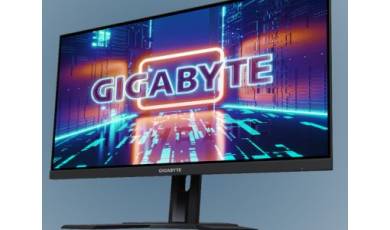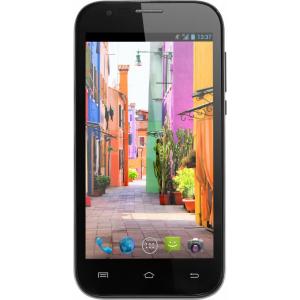Flash firmware on Jinga IGO L1
Mobiles >> Jinga >> Jinga IGO L1| Specifications | Reviews | Secret codes |
| Unlock phone | Root phone |
| Backup | Flash Firmware | Screenshot |
How to flash Jinga IGO L1?
Why reinstall the firmware?
Errors begin to appear in the Android OS.
Some applications stop opening.
Many programs from the Play Market do not start.
The phone restarts or shuts down for no reason.
The phone began to slow down a lot.
You are not satisfied with the functionality of the stock firmware.
Where can I find the firmware?
On the official Internet resource of the phone manufacturer.
On specialized services on which developers lay out custom or official OS.
What should be done before installing the firmware?
Create a backup copy of user data and transfer it to another medium.
Insert an SD card into your phone to write the firmware to it.
Remember your smartphone model.
Charge your phone fully.
Download the archive with Firmware and place it on the SD card.
Installing TWRP Recovery
Download the Official TWRP App from the Play Market. Download, install and launch the application..
When you start the application for the first time, you need to give consent to future manipulations, as well as to give consent to granting the application Superuser rights and click the 'OK' button.
After moving to the next screen, select the 'TWRP FLASH' item and provide the application with root rights.
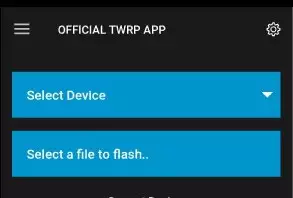
On the main screen of the application, the 'Select Device' drop-down list is available, in which you need to find and select the device model for installing the recovery.
After selecting the phone, the application will redirect the user to a web page to download the modified recovery environment image file. Download the proposed *.img file.
When the file is loaded, return to the main screen of the Official TWRP App and press the 'Select a file to flash' button. Select the file downloaded in the previous step.
Press the 'FLASH TO RECOVERY' button and confirm that you are ready to start the procedure - press 'OK' in the question window.
When the message 'Flash Completed Succsessfuly!' appears. Click 'OK'. The TWRP installation procedure can be considered complete.
Write the firmware and other necessary files to the SD card. Using a PC or laptop card reader, it will be much faster.
Insert a memory card into the device.
To reboot in recovery, it is convenient to use a special item in the Official TWRP App menu, accessible by pressing the button with three stripes in the upper left corner of the main screen of the application. We open the menu, select the 'Reboot' item, and then tap on the 'REBOOT RECOVERY' button. The phone will reboot into the recovery environment automatically.
Firmware via TWRP
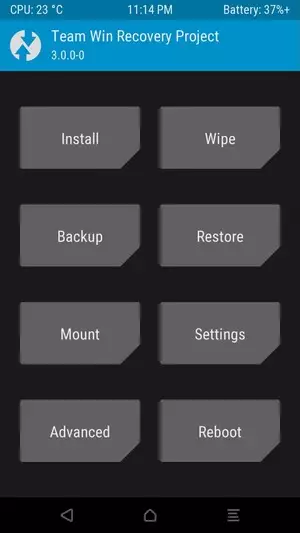
Before flashing, you need to clear the 'Cache' and 'Data' sections, press 'WIPE' on the main screen. You will delete all user data from the phone, this will avoid software errors and other problems.
Everything is ready to start flashing. Press the 'Install' button.
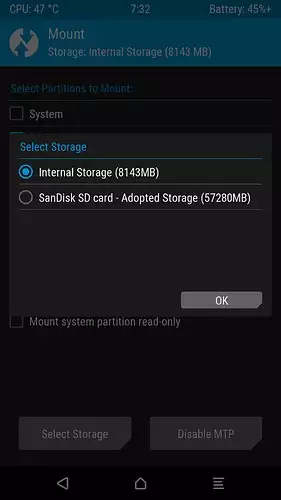
The file selection screen appears. At the very top is the 'Storage' button, select the location where the firmware file is located.
Select the location where you copied the files. Press the 'OK' button.
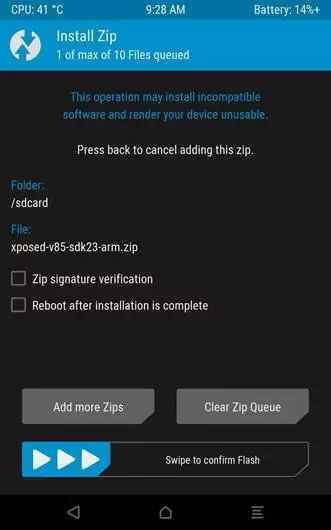
Find the file we need and click on it. A screen opens with a warning about possible negative consequences, as well as the item 'Zip signature verification'. This item should be checked by placing a cross in the check-box, which will avoid using damaged files when writing to the phone's memory sections.
The procedure for writing files to the phone's memory will begin, this is accompanied by the appearance of inscriptions in the log field and the movement of the progress bar.
The completion of the installation procedure is indicated by the inscription 'Successful'.
Summary: Type: Mobile; Battery: Li-Ion 1700 mAh; CPU: MediaTek MT6582, Quad Core 1.3GHz, ARM Mali 400; Smart Phone OS: Android 4.4.2; Dimensions: 72 x 144 x 8.5 mm; Formfactor: Bar; Keyboard: Screen; Sidekeys: Volume, Power; Softkeys: 3; Weight: 145 g; Color: Yes; Colors: 16M; Other: Capacitive Touchscreen, Multitouch; Pixel aspect ratio: 1.50; Resolution: 640x360; Display PPI: 245; Screen Size: 4.5; Type: TFT; Audio: AAC, AAC+, AMR, AWB, MP3, Vorbis, FLAC, APE, MIDI, WAV; Camera: 5MP, 2592x1944; Other: LED Flash, Autofocus, Continuous Shooting, Digital Zoom, Digital Image Stabilization, Geo-Tagging, Panorama, High Dynamic Range (HDR), Touch Focus, Face Detection, White Balanc ...
Comments, questions and answers on the flash firmware Jinga IGO L1
Ask a question about Jinga IGO L1



